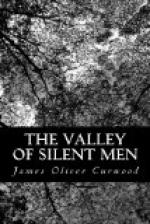The thunder of rapids and the howlings of storm do not frighten them. Death has no fear for them. They grapple with it, wrestle joyously with it, and are glorious when they win. Their blood is red and strong. Their hearts are big. Their souls chant themselves up to the skies. Yet they are simple as children, and when they are afraid, it is of things which children fear. For in those hearts of theirs is superstition—and also, perhaps, royal blood. For princes and the sons of princes and the noblest aristocracy of France were the first of the gentlemen adventurers who came with ruffles on their sleeves and rapiers at their sides to seek furs worth many times their weight in gold two hundred and fifty years ago, and of these ancient forebears Pierre and Henri and Jacques, with their Maries and Jeannes and Jacquelines, are the living voices of today.
And these voices tell many stories. Sometimes they whisper them, as the wind would whisper, for there are stories weird and strange that must be spoken softly. They darken no printed pages. The trees listen to them beside red camp-fires at night. Lovers tell them in the glad sunshine of day. Some of them are chanted in song. Some of them come down through the generations, epics of the wilderness, remembered from father to son. And each year there are the new things to pass from mouth to mouth, from cabin to cabin, from the lower reaches of the Mackenzie to the far end of the world at Athabasca Landing. For the three rivers are always makers of romance, of tragedy, of adventure. The story will never be forgotten of how Follette and Ladouceur swam their mad race through the Death Chute for love of the girl who waited at the other end, or of how Campbell O’Doone, the red-headed giant at Fort Resolution, fought the whole of a great brigade in his effort to run away with a scow captain’s daughter.
And the brigade loved O’Doone, though it beat him, for these men of the strong north love courage and daring. The epic of the lost scow—how there were men who saw it disappear from under their very eyes, floating upward and afterward riding swiftly away in the skies—is told and retold by strong-faced men, deep in whose eyes are the smoldering flames of an undying superstition, and these same men thrill as they tell over again the strange and unbelievable story of Hartshope, the aristocratic Englishman who set off into the North in all the glory of monocle and unprecedented luggage, and how he joined in a tribal war, became a chief of the Dog Ribs, and married a dark-eyed, sleek-haired, little Indian beauty, who is now the mother of his children.
But deepest and most thrilling of all the stories they tell are the stories of the long arm of the Law—that arm which reaches for two thousand miles from Athabasca Landing to the polar sea, the arm Of the Royal Northwest Mounted Police.
And of these it is the story of Jim Kent we are going to tell, of Jim Kent and of Marette, that wonderful little goddess of the Valley of Silent Men, in whose veins there must have run the blood of fighting men—and of ancient queens. A story of the days before the railroad came.




